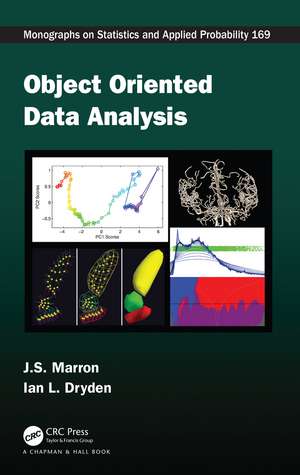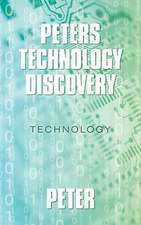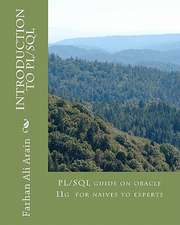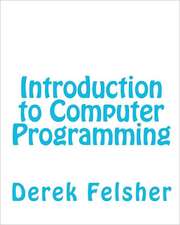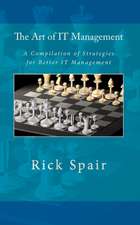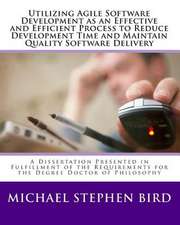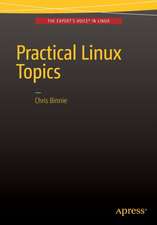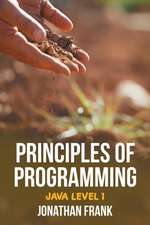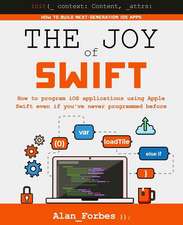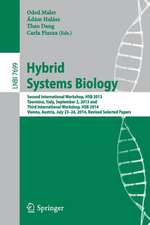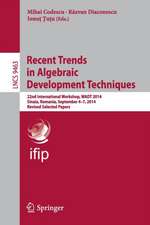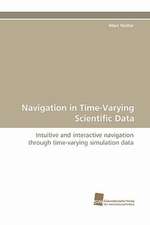Object Oriented Data Analysis: Chapman & Hall/CRC Monographs on Statistics and Applied Probability
Autor J. S. Marron, Ian L. Drydenen Limba Engleză Paperback – 27 mai 2024
The main points are illustrated with many real data examples, based on the authors' personal experiences, which have motivated the invention of a wide array of analytic methods.
While the mathematics go far beyond the usual in statistics (including differential geometry and even topology), the book is aimed at accessibility by graduate students. There is deliberate focus on ideas over mathematical formulas.
| Toate formatele și edițiile | Preț | Express |
|---|---|---|
| Paperback (1) | 298.92 lei 3-5 săpt. | +19.12 lei 10-14 zile |
| CRC Press – 27 mai 2024 | 298.92 lei 3-5 săpt. | +19.12 lei 10-14 zile |
| Hardback (1) | 690.21 lei 3-5 săpt. | +32.42 lei 10-14 zile |
| CRC Press – 24 noi 2021 | 690.21 lei 3-5 săpt. | +32.42 lei 10-14 zile |
Din seria Chapman & Hall/CRC Monographs on Statistics and Applied Probability
- 9%
 Preț: 732.26 lei
Preț: 732.26 lei -
 Preț: 339.35 lei
Preț: 339.35 lei -
 Preț: 328.46 lei
Preț: 328.46 lei - 9%
 Preț: 1209.32 lei
Preț: 1209.32 lei - 9%
 Preț: 645.60 lei
Preț: 645.60 lei -
 Preț: 358.45 lei
Preț: 358.45 lei - 8%
 Preț: 383.57 lei
Preț: 383.57 lei - 9%
 Preț: 1006.44 lei
Preț: 1006.44 lei - 9%
 Preț: 643.14 lei
Preț: 643.14 lei -
 Preț: 340.83 lei
Preț: 340.83 lei - 9%
 Preț: 645.45 lei
Preț: 645.45 lei - 9%
 Preț: 641.83 lei
Preț: 641.83 lei - 26%
 Preț: 876.87 lei
Preț: 876.87 lei - 18%
 Preț: 1107.27 lei
Preț: 1107.27 lei - 9%
 Preț: 606.13 lei
Preț: 606.13 lei - 18%
 Preț: 1110.38 lei
Preț: 1110.38 lei - 18%
 Preț: 1108.83 lei
Preț: 1108.83 lei - 25%
 Preț: 526.38 lei
Preț: 526.38 lei - 23%
 Preț: 427.84 lei
Preț: 427.84 lei -
 Preț: 484.06 lei
Preț: 484.06 lei - 25%
 Preț: 499.81 lei
Preț: 499.81 lei - 15%
 Preț: 669.42 lei
Preț: 669.42 lei - 25%
 Preț: 487.34 lei
Preț: 487.34 lei - 26%
 Preț: 876.78 lei
Preț: 876.78 lei - 18%
 Preț: 699.51 lei
Preț: 699.51 lei - 25%
 Preț: 999.62 lei
Preț: 999.62 lei - 22%
 Preț: 413.08 lei
Preț: 413.08 lei - 23%
 Preț: 456.19 lei
Preț: 456.19 lei - 15%
 Preț: 485.67 lei
Preț: 485.67 lei - 18%
 Preț: 754.74 lei
Preț: 754.74 lei - 15%
 Preț: 713.33 lei
Preț: 713.33 lei - 26%
 Preț: 877.30 lei
Preț: 877.30 lei - 18%
 Preț: 912.30 lei
Preț: 912.30 lei - 25%
 Preț: 630.75 lei
Preț: 630.75 lei - 25%
 Preț: 1000.51 lei
Preț: 1000.51 lei - 25%
 Preț: 628.29 lei
Preț: 628.29 lei - 15%
 Preț: 645.08 lei
Preț: 645.08 lei - 22%
 Preț: 370.35 lei
Preț: 370.35 lei - 18%
 Preț: 1148.20 lei
Preț: 1148.20 lei - 18%
 Preț: 1317.20 lei
Preț: 1317.20 lei - 15%
 Preț: 666.70 lei
Preț: 666.70 lei - 15%
 Preț: 671.36 lei
Preț: 671.36 lei - 15%
 Preț: 485.67 lei
Preț: 485.67 lei
Preț: 298.92 lei
Preț vechi: 373.65 lei
-20% Nou
Puncte Express: 448
Preț estimativ în valută:
57.25€ • 58.98$ • 47.96£
57.25€ • 58.98$ • 47.96£
Carte disponibilă
Livrare economică 01-15 februarie
Livrare express 21-25 ianuarie pentru 29.11 lei
Preluare comenzi: 021 569.72.76
Specificații
ISBN-13: 9781032114804
ISBN-10: 1032114800
Pagini: 436
Ilustrații: 392
Dimensiuni: 156 x 234 x 24 mm
Greutate: 0.45 kg
Ediția:1
Editura: CRC Press
Colecția Chapman and Hall/CRC
Seria Chapman & Hall/CRC Monographs on Statistics and Applied Probability
Locul publicării:Boca Raton, United States
ISBN-10: 1032114800
Pagini: 436
Ilustrații: 392
Dimensiuni: 156 x 234 x 24 mm
Greutate: 0.45 kg
Ediția:1
Editura: CRC Press
Colecția Chapman and Hall/CRC
Seria Chapman & Hall/CRC Monographs on Statistics and Applied Probability
Locul publicării:Boca Raton, United States
Public țintă
Professional Practice & DevelopmentCuprins
- What is OODA?
- Breadth of OODA
- Data Object Definition
- Exploratory and Confirmatory Analyses
- OODA P6
- Data Visualization
- Distance Based Methods
- Manifold Data Analysis
- FDA Curve Registration
- Graph Structured Data Objects
- Classification - Supervised Learning
- Clustering - Unsupervised Learning
- High Dimensional Inference
- High Dimensional Asymptotics
- Smoothing and SiZer
- Robust Methods
- PCA Details and Variants
- OODA Context and Related Areas
Recenzii
I wrote a report last year on an earlier draft of the book. I was enthusiastic then and I remain so. I can see the book being very popular both with graduate students and with more advanced researchers in disciplines such as Statistics, Biology, Computer Science and Engineering. There is lots of common sense advice, a lot of informative graphs, and not too much theory…I regard the manuscript as a breath of fresh air in an area where there can be a tendency to make the material overly technical."
-John Kent, University of Leeds
"We need this book badly in statistics. This field, like most in the mathematical sciences tends to generate a literature that offers more and more exposition of research on less and less. The authors say this well in their first two pages, where they point out how much of statistical practice, literature and software assumes data in the form of a two-dimensional table. As in functional data analysis, the theoreticians will sniff and grouch about the lack of theory, but this quickly follows as they see the opportunities for more intense mathematical effort in the area. Both authors are high levels theoreticians in their own right."
-Jim Ramsay, McGill University
"The chapters I have read are very informative and convey the deep insight of two senior specialists in the field. This is very valuable, especially for younger scientists that want to quickly grasp the fundamentals of the field…The particular strength of this book is that is connects classical statistics, "classical" machine learning and statistics on non-Euclidean spaces with one another…This is a book I have been waiting for and I love to read it in detail and profit from it for research and teaching, once it is finished."
-Stephan F. Huckemann, Georgia-Augusta-University Goettingen
"This textbook represents an exciting and timely project highlighting the importance of non-Euclidean data across different scientific applications. It uses numerous examples to motivate this scientific approach, to engage researchers from different backgrounds and experiences. The textbook starts by introducing OODA–overview, contexts, and preliminaries. The main focus of the textbook is on statistical case studies driven by non-Euclidean data. The principal component analysis is frequently used as a primary data analysis tool, extracting interesting patterns from the data. Then the textbook moves into specific methods – distance-based methods, visualizations, shapes, curves, and trees. In the last part, the manuscript focuses on pattern analysis techniques – clustering, classification, smoothing, and asymptotics. I strongly recommend the publication of this textbook. This manuscript covers important and fast-developing topic areas that are important in many applications."
-Anuj Srivastava, Florida State University
"(...) this monograph is destined, without doubt, to become the classic introductory text on OODA. Graduate students contemplating research in statistics and/or data science who have studied introductory courses in multivariate analysis and smoothing and robust methods will find it a gentle introduction, and also an inspiring one because it identifies many areas of the field that are in their infancy and which need to be more fully developed. It also provides great insight into how classical methods perform in not so standard setups, particularly for high dimensional data, and describes alternatives to them having enhanced performance. Its extensive bibliography constitutes an essential resource for those embarking on research into statistical and data science methodology for contexts involving complex data."
-Arthur Pewsey, in Journal of the Royal Statistical Society, Series A, March 2022
-John Kent, University of Leeds
"We need this book badly in statistics. This field, like most in the mathematical sciences tends to generate a literature that offers more and more exposition of research on less and less. The authors say this well in their first two pages, where they point out how much of statistical practice, literature and software assumes data in the form of a two-dimensional table. As in functional data analysis, the theoreticians will sniff and grouch about the lack of theory, but this quickly follows as they see the opportunities for more intense mathematical effort in the area. Both authors are high levels theoreticians in their own right."
-Jim Ramsay, McGill University
"The chapters I have read are very informative and convey the deep insight of two senior specialists in the field. This is very valuable, especially for younger scientists that want to quickly grasp the fundamentals of the field…The particular strength of this book is that is connects classical statistics, "classical" machine learning and statistics on non-Euclidean spaces with one another…This is a book I have been waiting for and I love to read it in detail and profit from it for research and teaching, once it is finished."
-Stephan F. Huckemann, Georgia-Augusta-University Goettingen
"This textbook represents an exciting and timely project highlighting the importance of non-Euclidean data across different scientific applications. It uses numerous examples to motivate this scientific approach, to engage researchers from different backgrounds and experiences. The textbook starts by introducing OODA–overview, contexts, and preliminaries. The main focus of the textbook is on statistical case studies driven by non-Euclidean data. The principal component analysis is frequently used as a primary data analysis tool, extracting interesting patterns from the data. Then the textbook moves into specific methods – distance-based methods, visualizations, shapes, curves, and trees. In the last part, the manuscript focuses on pattern analysis techniques – clustering, classification, smoothing, and asymptotics. I strongly recommend the publication of this textbook. This manuscript covers important and fast-developing topic areas that are important in many applications."
-Anuj Srivastava, Florida State University
"(...) this monograph is destined, without doubt, to become the classic introductory text on OODA. Graduate students contemplating research in statistics and/or data science who have studied introductory courses in multivariate analysis and smoothing and robust methods will find it a gentle introduction, and also an inspiring one because it identifies many areas of the field that are in their infancy and which need to be more fully developed. It also provides great insight into how classical methods perform in not so standard setups, particularly for high dimensional data, and describes alternatives to them having enhanced performance. Its extensive bibliography constitutes an essential resource for those embarking on research into statistical and data science methodology for contexts involving complex data."
-Arthur Pewsey, in Journal of the Royal Statistical Society, Series A, March 2022
Descriere
Object Oriented Data Analysis (OODA) provides a useful general framework for the consideration of many types of Complex Data. It is deliberately intended to be particularly useful in the analysis of data in complicated situations which are typically not easily represented as an unconstrained matrix of numbers.
